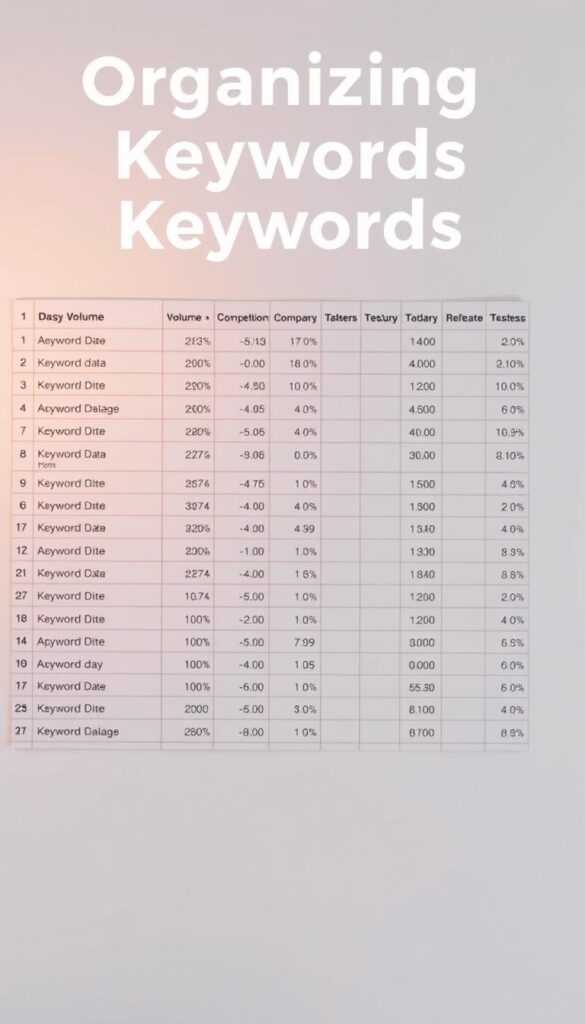
We know that effective search engine optimization (SEO) is key for online success. SEO focuses on finding and studying the words and phrases people search for online.
This helps businesses attract the right visitors to their site. It also boosts their online presence and SEO success. Mastering keyword research is vital for knowing your audience and creating content they need.
In this article, we’ll share the top keyword research tips for SEO success.
Key Takeaways
- Understand the importance of keyword research in SEO
- Learn how to identify and analyze relevant keywords
- Discover how to align your content with your target audience’s needs
- Improve your online visibility and drive targeted traffic
- Boost your SEO success with effective keyword research
Understanding the Importance of Keyword Research
Keyword research is key for businesses wanting to boost their online presence and attract the right visitors. It’s not just about finding the right words. It’s about knowing our audience, creating engaging content, and staying ahead online.
Exploring keywords helps us learn what our audience wants and needs. This knowledge is crucial for making content that speaks to them and solves their problems.
Why Keywords Matter in SEO
Keywords are essential in SEO because they help search engines understand our content. Using the right keywords can make our site more visible, attract better leads, and increase sales.
Here’s why keywords are important in SEO:
- Improved Search Engine Rankings: The right keywords can help us rank higher in search results.
- Enhanced Content Relevance: Keywords make our content more relevant to our audience, leading to better engagement and conversion.
- Better Competitor Analysis: Studying our competitors’ keywords can reveal their strengths and weaknesses.
The Role of Keywords in Content Strategy
A good keyword strategy is crucial for our content plan. It helps us create content that’s both useful and search engine-friendly.
Keywords shape our content strategy in several ways:
- Content Creation: Keywords guide us in making content that meets our audience’s needs and interests.
- Content Optimization: Using relevant keywords can improve our content’s search engine ranking.
- Content Marketing: A keyword-driven strategy can help us better engage our target audience.
Understanding the value of keyword research is vital for a successful digital marketing plan. Whether it’s long-tail keywords or a detailed strategy, the benefits are clear.
Identifying Your Target Audience
Finding your target audience is key to a strong keyword research plan. You need to know who your ideal customers are and what they search for online. This helps tailor your content and SEO efforts.
Understanding User Intent
User intent is crucial in keyword research. It’s not just about the keywords, but why people use them. Knowing this helps you create content that meets their needs and boosts your search rankings.
For example, someone searching for “best running shoes” might want product reviews. On the other hand, “how to tie running shoes” seekers need tutorials. Tailor your content to match what your audience is looking for.
“The key to successful keyword research is understanding the intent behind the keywords. It’s not just about the words; it’s about what people are trying to achieve when they use those words.”
Conducting Audience Research
Doing thorough audience research is vital for creating buyer personas. You need to know your audience’s demographics, interests, pain points, and online behavior. By analyzing this data, you can understand what your audience wants and how to meet their needs with your content.
Some key steps in conducting audience research include:
- Analyzing your website analytics to understand your current audience
- Conducting surveys or polls to gather more information about your audience’s preferences and pain points
- Using social media listening tools to understand what your audience is talking about and what they are interested in
| Research Method | Description | Benefits |
|---|---|---|
| Website Analytics | Analyzing data from your website to understand audience behavior | Provides insights into audience demographics and online behavior |
| Surveys and Polls | Gathering information directly from your audience through surveys and polls | Helps understand audience preferences and pain points |
| Social Media Listening | Monitoring social media conversations related to your brand or niche | Provides insights into audience interests and concerns |
By using these research methods, you can get a full picture of your target audience. This helps you develop a keyword strategy that speaks to them.

Tools for Effective Keyword Research
In the world of SEO, finding the right keywords is key. To boost your SEO, picking the best keyword tool is essential. There are many tools out there, so it’s important to choose wisely.

⭐️ Tap the exclusive deal link https://temu.to/k/uot8tcxvwum to score top-quality items at ultra-low prices. 🛍️ These unbeatable deals are only available here. Shop now and save big! ⭐️ Directly get exclusive deal in Temu app here: https://app.temu.com/m/mhb5rstagbx
Another surprise for you! Click https://temu.to/k/uag0bn0o0wd to earn with me together🤝!
Popular Keyword Research Tools
Many SEO experts rely on certain tools for their accuracy and features. Google Keyword Planner is a top choice for those using Google Ads. It gives insights into how often keywords are searched and how competitive they are.
SEMrush and Ahrefs are also favorites. They offer detailed competitor analysis, keyword ideas, and tips for improving your content. Ubersuggest helps with finding keywords and understanding their difficulty level.
- Google Keyword Planner: Great for Google Ads users, with data on search volume and competition.
- SEMrush: Provides in-depth competitor analysis, keyword ideas, and content tips.
- Ahrefs: Offers a wide range of keyword data, backlink analysis, and content insights.
- Ubersuggest: Good for finding keywords and checking their difficulty.
Comparing Free and Paid Options
Deciding between free and paid keyword tools is a big choice. Free tools like Google Keyword Planner are perfect for beginners. They provide basic features to start with keyword research.
Paid tools like SEMrush and Ahrefs have more advanced features. They include competitor analysis, keyword tracking, and content tips. These are great for businesses with a solid SEO plan, aiming to improve their keyword and content strategies.
Choosing between free and paid tools depends on your needs, budget, and SEO strategy. Knowing what each tool offers helps you pick the best one for your business goals.
Choosing the Right Keywords
Effective keyword research is about finding the right keywords for your content and audience. This is key to making your website more visible and attracting the right visitors.
Short-tail vs. Long-tail Keywords
It’s important to know the difference between short-tail and long-tail keywords. Short-tail keywords are short and general, like “shoes.” They get a lot of searches but are very competitive. Long-tail keywords are longer and more specific, like “women’s size 8 running shoes.” They have lower search numbers and less competition.
For example, “shoes” is a short-tail keyword. “Women’s size 8 running shoes” is a long-tail keyword. Long-tail keywords help you reach specific searches and bring more relevant visitors to your site.
| Keyword Type | Characteristics | Example |
|---|---|---|
| Short-tail | High search volume, high competition | shoes |
| Long-tail | Lower search volume, less competition | women’s size 8 running shoes |
Analyzing Keyword Difficulty
Choosing the right keywords also means looking at their difficulty. Keyword difficulty shows how hard it is to rank for a keyword. It depends on how many competing sites there are, their authority, and the quality of their content.
To check keyword difficulty, SEO tools give a difficulty score. This score tells you if a keyword is good for your site based on its current strength and competition.

By understanding short-tail and long-tail keywords and analyzing difficulty, you can choose better keywords. This improves your content and boosts your search rankings.
Analyzing Competitor Keywords
Looking at what keywords our competitors use is key to finding new SEO chances. By seeing what keywords they aim for, we can make our SEO plan better.
To really get into competitor keyword analysis, we first have to find our main competitors. We look at businesses that rank for the same keywords we want or are in the same niche.
Identifying Top Competitors
Finding our top competitors means studying our market well. We start by searching our target keywords on search engines. Then, we note which sites always show up at the top.
Using tools that show our competitors’ online presence is also smart. These tools help us see their strong and weak points, especially in keyword strategy.
Tools for Competitor Keyword Analysis
There are many tools to help with competitor keyword analysis. Ahrefs and SEMrush are two top picks. They both have lots of features for checking out competitor keywords.
| Tool | Features | Benefits |
|---|---|---|
| Ahrefs | Keyword research, backlink analysis, content analysis | It gives a full view of what our competitors do with keywords and shows where we can improve. |
| SEMrush | Competitor analysis, keyword research, technical SEO audit | It shows us what our competitors do with keywords and helps us find ways to get better. |
With these tools, we can really understand our competitors’ keyword plans. Then, we can adjust our own strategy to keep up.

Looking at competitor keywords helps us see what works for them. It also shows us gaps and chances to make our SEO better.
Organizing Your Keywords
Organizing your keywords is key to a good content strategy. It helps you plan your content better, find gaps, and boost your SEO keyword research skills.
Creating a Keyword List
The first step is to make a detailed keyword list. Put all your relevant keywords from your research in one spot. Make sure to include both short-tail and long-tail keywords to cover more search queries.
Use tools like spreadsheets or keyword management software to organize your list. These tools help you sort, prioritize, and update your keywords easily.

Categorizing Keywords for Content Planning
Grouping your keywords is vital for planning your content. It lets you see topic clusters and plan content that meets your audience’s needs.
Here’s how you can group keywords by theme:
| Category | Keywords | Content Opportunity |
|---|---|---|
| SEO Basics | SEO tips, SEO strategy, keyword research | Beginner’s guide to SEO |
| Content Marketing | Content strategy, blog posting, content creation | Content marketing best practices |
| Keyword Research Tools | Ahrefs, SEMrush, Moz keyword research | Review of keyword research tools |
By grouping your keywords, you can shape your keyword strategy and create content that connects with your audience. This method improves your SEO and helps in making a unified content plan.
Utilizing Keywords in Your Content
Using keywords in your content is key to better search engine rankings. It’s important to know how to use them to make your content easy to read and valuable for SEO.
Best Practices for Keyword Placement
There are a few key practices for placing keywords. First, put your main keyword in your content’s title. This tells search engines what your page is about. Also, use keywords in headings (H1, H2, H3, etc.) to organize your content and highlight key points.
Another good strategy is to include keywords in your meta description. This doesn’t directly affect your rankings but can make your search result more appealing. Try to use your main keyword about 1-2 times per 100 words in your content.

Avoiding Keyword Stuffing
Keywords are important, but don’t overdo it. Keyword stuffing is when you load a page with too many keywords to try to rank higher in Google. Instead, focus on creating engaging content that naturally includes your target keywords.
To avoid keyword stuffing, use different forms of your keywords and synonyms. This keeps your content fresh and relevant. Also, consider using long-tail keywords, which are more specific and less competitive.
| Keyword Practice | Description | SEO Benefit |
|---|---|---|
| Natural Keyword Incorporation | Using keywords in a way that feels natural and doesn’t disrupt the flow of your content. | Improves readability and SEO value. |
| Avoiding Keyword Stuffing | Not overusing keywords to the point where your content becomes unnatural or spammy. | Prevents penalties from search engines. |
| Using Long-tail Keywords | Incorporating more specific phrases with lower search volumes. | Targets specific search queries with less competition. |
By following these best practices and avoiding keyword stuffing, you can effectively use keywords in your content. This will help improve your SEO efforts.
Monitoring Keyword Performance
It’s key to watch how our keywords do to see if our SEO plan is working. We need to track our keywords and figure out what affects their ranking.
Using tools like Google Analytics and Google Search Console helps us see how well our SEO is doing. We can spot what needs work and tweak our plans.
Tracking Keyword Rankings
Keeping an eye on where our keywords rank is very important. We use tools to see how our keywords change over time. This helps us understand what makes our SEO better or worse.
Some top tools for checking keyword rankings are:
- Google Search Console
- Ahrefs
- SEMrush
- Moz
These tools not only track our rankings but also show us what our competitors are up to. This helps with competitor keyword research.
| Tool | Primary Function | Additional Features |
|---|---|---|
| Google Search Console | Track keyword rankings | Insights into search queries, impressions, and clicks |
| Ahrefs | Comprehensive keyword analysis | Backlink analysis, content analysis, and competitor research |
| SEMrush | Technical SEO audits | Competitor analysis, keyword research, and content optimization |

Adjusting Strategies Based on Performance
After we get data on our keyword performance, we need to tweak our SEO plans. This might mean updating our keyword list, improving current content, or making new content for better keywords.
By always checking our keyword performance and making changes, we can boost our search rankings. This brings more relevant visitors to our site and helps our SEO succeed.
Keeping Up with Trends
The world of search engine queries is always changing. We must keep up with these changes to succeed in SEO.
To stay ahead, we need to know about the tools and methods out there. Google Trends is a great tool for seeing how search interest changes over time.
Using Google Trends for Insights
Google Trends helps us understand what people are searching for. It lets us:
- Find new trends and update our content plans.
- See how search queries change with the seasons.
- See which keywords are more popular.
For example, Google Trends can show us how our target keywords are doing. This helps us improve our keyword strategy and SEO.

Adapting to Seasonal Changes
Search habits often change with the seasons. Some keywords get more attention at certain times. By looking at these patterns, we can:
- Plan our content to match seasonal trends.
- Change our SEO keyword research to include seasonal keywords.
- Make our website and content better for users during busy times.
By keeping up with trends and adjusting our strategy for the seasons, we can stay competitive in SEO.
Local Keyword Research
Local keyword research is key for any SEO strategy in specific areas. It makes businesses more visible in local searches by using location-based terms.
For local businesses, knowing about local keyword research is essential. It helps find out what local customers search for online.
Focusing on Local SEO Keywords
Understanding your local audience’s search habits is crucial. Use keywords like city names, zip codes, or regional terms.
Key strategies for local SEO keywords include:
- Using location-specific keywords in your website content
- Optimizing your Google My Business listing
- Creating content that is relevant to local events or news
Tools for Local Keyword Insights
Many tools offer insights for local keyword research. The Google Keyword Planner is a top choice for finding related keywords.
Other tools include:
| Tool | Description | Features |
|---|---|---|
| Google Keyword Planner | A free tool for finding keywords | Keyword suggestions, search volume data |
| Ahrefs | A comprehensive SEO toolset | Keyword research, competitor analysis |
| SEMrush | An all-in-one digital marketing tool | Keyword research, technical SEO audits |
SEO expert Rand Fishkin says, “Local SEO is more than ranking for a keyword. It’s about being seen by potential customers.”
“Local SEO is about being visible to the people who are most likely to become customers.”

Staying Up-to-Date with SEO Changes
To stay ahead in search engine optimization, we need to keep up with the latest news. We should regularly check and update our keyword strategy. This is based on how well it’s doing, changes in the industry, and new search trends.
Following top SEO blogs and news sites is a good way to stay informed. Sites like Moz and Search Engine Journal share important updates on keyword analysis and trends.
Staying Informed through SEO Communities
Joining SEO communities, like Reddit’s r/SEO, is also helpful. It lets us connect with others, share tips, and learn about new strategies. This way, we can make our keyword strategy better and keep up with SEO changes.
By always learning and improving our keyword research, we can get more people to see our content. This helps us reach our goals online.



